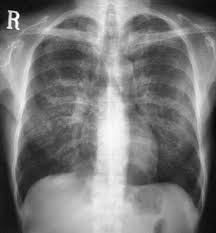 Pneumocystis jiroveci pneumonia is a fungal infection of the lungs.
Pneumocystis jiroveci pneumonia is a fungal infection of the lungs.
It is an atypical fungus that scavengers host cholesterol for its membranes rather than synthesizing ergosterol, therefore the treatment with oral antifungal agents or amphotericin is not effective.
The disease used to be called Pneumocystis carini or PCP pneumonia.
Casuses:
This type of pneumonia is caused by the fungus Pneumocystis jiroveci.
This fungus is common in the environment and rarely causes illness in healthy people.
However, it can cause a lung infection in people with a weakened immune system due to:
Cancer:
Long-term use of corticosteroids or other medicines that weaken the immune system
HIV/AIDS:
Organ or bone marrow transplant
Pneumocystis jiroveci was a rare infection before the AIDS epidemic.
Before the use of preventive antibiotics for the condition, most people in the United States with advanced AIDS often developed this infection.
Symptoms:
Pneumocystis pneumonia in people with AIDS usually develops slowly over days to weeks or even months, and is less severe.
People with pneumocystis pneumonia who do not have AIDS usually get sick faster and are more severely ill.
Symptoms include:
Cough – often mild and dry, fever, rapid breathing, shortness of breath, especially with exertion.
Patients typically present with fever, nonproductive, cough, dyspnea, hypoxemia with diffuse bilateral groundglass opacities on chest imaging.
Exams and Tests:
Tests that may be ordered include:
Blood gases
Bronchoscopy (with lavage)
Lung biopsy
X-ray of the chest
Sputum exam to check for fungus that causes the infection
CBC
Beta-1,3 glucan level in the blood
Treatment
Anti-infection medicines can be given by mouth (orally) or through a vein (intravenously), depending on how severe the illness is.
People with low oxygen levels and moderate to severe diseaseare often prescribed corticosteroids as well.
Trimethoprim-sulfamethoxazole is the corner stone of pneumocystis pneumonia treatment.
This antibiotic combination disrupts folate synthesis crucial to growth and reproduction of the organism by blocking to enzymes that are not expressed in humans dihydrofolate reductase and dihydropteroate synthase.
Prognosis
Pneumocystis pneumonia can be life threatening. It can cause respiratory failure that can lead to death.
People with this condition need early and effective treatment.
For moderate to severe pneumocystis pneumonia in people with HIV/AIDS, the short term use of corticosteroids has decreased the incidence of death.
Possible Complications
Complications that may result include:
Pleural effusion (extremely rare)
Pneumothorax (collapsed lung)
Respiratory failure (may require breathing support)
Prevention:
PCP can be prevented by reducing immuno suppression, and with chemoprophylaxis.
Preventive therapy is recommended for:
People with HIV/AIDS who have CD4 counts below 200 cells/microliter or 200 cells/cubic millimeter
Bone marrow transplant recipients
Organ transplant recipients
People who take long-term, high-dose corticosteroids
People who have had previous episodes of this infection
People who take long-term immunomodulatory drugs.
Patients with acute lymphoblastic leukemia, receiving anti-leukemia therapy.
Patients being treated with anti-CD 52 antibody agents, PIK,3 inhibitors, concurrent radiotherapy, patients with purine analogue chemotherapy agents and recipients of CAR T cell therapy.
Trimethoprim – sulfamethoxazole is the drug of choice for PCP prophylaxis for patients with and without HIV.
Alternatives for PCP prophylaxis include: atovaquone, dapsone, and monthly administration of aerosolized pentamidine.
Prophylaxis for PCP should continue as long as immunosuppressive state persists.
